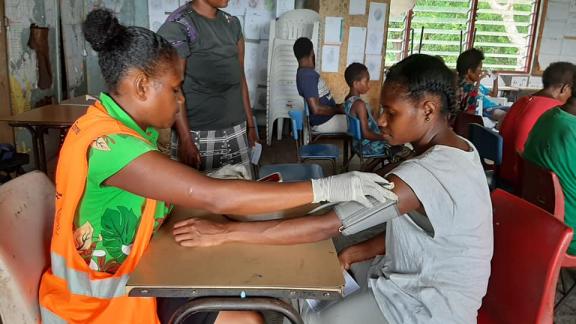The 3rd Pacific Human Rights Conference (PHRC) on Sexual Orientation, Gender Identity, Expression, and Sex Characteristics (SOGIESC) held in Nadi, Fiji, aimed to foster collaboration and insights to advance development justice, gender and human rights and social inclusion for Pacific Islanders of diverse SOGIESC+.
With the theme "Pacific Islanders of Diverse SOGIESC: Working for Global Justice and Local Human Rights," the conference was a movement of strength from across the vast Oceania region, working towards designing lasting efforts for a just, resilient, decolonised, and peaceful Pacific region that respects universal human rights, gender, social, economic, climate, and ecological justice while defending the living planet.
The 3rd PHRC built on the successes of the 2015 and 2018 conferences, focusing on justice, decoloniality, and human rights across the Pacific. Over 230 participants, including activists, civil society organisations, Indigenous and First Nations representatives, government officials, academics, researchers, development agencies, and private sector members from 38 countries and territories, attended.

Diverse SOGIESC Inclusion in Humanitarian Contexts
IPPF hosted an inaugural parallel session focused on inclusive sexual and reproductive health and rights (SRHR) in humanitarian settings, presenting a great opportunity to amplify collective work with Member Associations (MA) on SRHR.
The session featured a conversational panel and a dynamic mini-simulation exercise led by Dean Kapitangata, Humanitarian Focal Point at the Cook Islands Family Welfare Association (CIFWA). Panellists included representatives from the Fiji Disabled People’s Federation (FDPF), Adventist Development & Relief Agency (ADRA), Ministry of Health of Fiji, Aberaam Tata (Youth Officer, Kiribati Family Health Association (KFHA), Rainbow Pride Foundation (RPF), and VPride Vanuatu. Highlights of the discussions included:
- The vulnerabilities of LGBTQ+ individuals during humanitarian crises, with recommendations for inclusive policies for humanitarian responses and the advocacy for LGBTQIA+ rights and recognition in national frameworks.
- The role of technology in providing access to information and services during disasters while addressing challenges in technology access and inclusive communication systems.
- The importance of documenting traditional knowledge within marginalised communities for disaster preparedness and incorporating comprehensive SRH services in disaster response planning.
- A comprehensive SRH toolkit tailored to the diverse needs of the LGBTQIA+ community in humanitarian contexts, providing guidelines, resources, and best practices for delivering inclusive SRH services during emergencies.
Advancing Justice and Honouring Pasifika Identities
The conference achieved several significant outcomes. It enhanced regional understanding of gender justice, SOGIESC, LGBTQIA+ human rights, and social, economic, ecological, and climate justice. Additionally, it increased awareness of existing and potential resources, best practices, and innovative approaches.
Strengthening PIDSOGIESC-led activists, groups, networks, and collaborations was a key focus. The development of national and regional development justice priorities by and for Pacific LGBTQIA+ people, considering their diversity and intersectionality, was highlighted. Plans for increased PIDSOGIESC-led activism, advocacy, and community engagement were established. Moreover, enhanced participation in Pacific Islanders of Diverse Sexual Orientations and Gender Identities & Expressions and Sex Characteristics (PIDSOGIESC)-led collective analysis, policy influence, advocacy, and movement-building efforts was a significant outcome.
The conversation also focused on honouring, recognising, and taking pride in Pasifika terms for people with diverse identities. Instead of solely using LGBTQIA+, acknowledge and celebrate existing Pasifika terminology MVPPFAFF+ (Mahu [Hawaii/Tahiti], Vakasalewalewa [Fiji], Palopa [PNG], Faa'fafine [Samoa], Akava'ine [Cook Islands], Fakafifine [Niue], Fakaleiti/Leiti [Tonga]).
Indigenous queer movements throughout the Pacific region, especially MVPPFAFF+ people, emphasised the importance of decolonising efforts to preserve positive non-binary cultural identities.

Youth Leadership, Education and Mental Health
With young people aged 15-24 comprising 18% of the Pacific's population, engaging LGBTQ+ youth was a recurring theme. Intergenerational mentorship networks and knowledge-sharing platforms are needed to empower the LGBTQ+ movement. Youth-led initiatives and capacity-building programs should be supported to enhance leadership, advocacy, and resilience, fostering meaningful participation in decision-making spaces.
School policies must ensure Comprehensive Sexuality Education (CSE), known as Family Life Education (FLE) in the Pacific, inclusively covers diverse SOGIESC topics, fostering a safe student environment. Mental health support is essential, with calls to include services for LGBTQ+ students and integrate mental health support into educational policies. Discussions emphasised investing in training healthcare providers to offer culturally competent and inclusive SRHR services, preventing discrimination against PIDSOGIESC+ individuals.
Solidarity in Action
The recent violent attack on Esther, a transgender woman and sex worker in Fiji, resonated deeply throughout the conference. IPPF ESEAOR stands firmly with the LGBTIQ+ community, human rights defenders, and allies, calling for immediate measures to protect the rights and safety of transgender people and sex workers across the region.
The conference concluded with a powerful message of solidarity in action: where there is diversity, there must be harmony. “Diversity has shaped our past, defined our present, and must be safeguarded for our future.”

Written by Jessica Work (Youth Networker, Pacific), edited by Malarvili Meganathan (Regional Communications, Voice and Media Advisor) & Maria Nailevu, Community Engagement & Partnerships Officer (Pacific)
For more information, contact the IPPF ESEAOR External Relations Team at [email protected].
when









